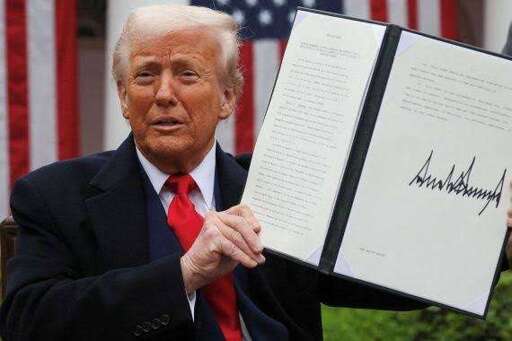Bernstein Posits That A 10 Percent Baseline US Tariff On Raw Semiconductors Is "Not Going To Do All That Much," But PCs, Servers, And Smartphones Are About To Get Pricier By ~40 Percent
-
Or didnt vote against it
-
Except that's not what happened, companies used the slowdowns in shipping from Covid shutdowns as an excuse to raise prices, then never lowered them. This isn't inflation, this was intentionally planned, don't belive me? Listen to their fucking earnings calls specifically saying it out loud.
-
The internet is about to feel a lot slower for us as more services move offshore to flee the taxes.
-
How do you bankrupt a casino while also running a money laundering scheme and still fail? Someone should turn his life into a movie it'd be like anti breaking bad
-
Trump is making more enemies in business than the most liberal of democrat presidents could ever do. That's impressive.
-
Okay this post reeks of not understanding basic accounting. Bringing back cash doesn’t affect profits for firms. The earnings were already earned. Having money over seas and bringing it on shore does not increase your profits, it just frees it up for investment (or giving to shareholders).
Also cutting R&D does not change profits in the short term. Any amount of R&D doesn’t change profits in the short term (either less or more). R&D is treated as an asset and depreciates over time (which does affect profits) but that’s clearly not what you’re saying here.
The rest of your post I’m not arguing with but your understanding of accounting and how offshore money works is factually incorrect.
-
https://www.bea.gov/news/2019/direct-investment-country-and-industry-2018
The TCJA generally eliminated taxes on dividends, or repatriated earnings, to U.S. multinationals from their foreign affiliates. Dividends of $776.5 billion in 2018 exceeded earnings for the year, which led to negative reinvestment of earnings, decreasing the investment position for the first time since 1982. Tables 3 and 4 provide information on the country and industry breakdown of dividends.
By country, nearly half of the dividends in 2018 were repatriated from affiliates in Bermuda ($231.0 billion) and the Netherlands ($138.8 billion). Ireland was the third largest source of dividends, but its value is suppressed due to confidentiality requirements. By industry, U.S. multinationals in chemical manufacturing ($209.1 billion) and computers and electronic products manufacturing ($195.9 billion) repatriated the most in 2018.
-
That is an extremely simplified take of what inflation is.
Here's a fun example as to why just saying "inflation means prices go up" doesn't make sense, what happens when a group of companies conspire to raise prices simultaneously? Is that inflation or is that price fixing?
https://www.propublica.org/article/yieldstar-rent-increase-realpage-rent -
In your scenario that’s inflation caused by price fixing. You seem to be saying these things are mutually exclusive but I don’t understand why you would say that.
Presumably price fixing in one industry would have trouble causing general systemic inflation. But simultaneous greed and price fixing through many industries all at once? Sure, that would do it.
-
I'm sure corporations aren't going to use this excuse to hike the prices even more, like they did with the energy crisis ...
-
I suppose my point is if we put any cause of rising prices under the "inflation" umbrella, it gives people the wrong idea as to the cause. Rather then just specifying what is causing prices to rise, people just say "it's inflation."
-
And who is eligible to actually vote in the election
-
Bankruptcy is a strategy at the corporate level.
-
Look at the money supply compared to inflation. Inflation went up due to supply shocks, central banks printed money as supply shocks eased, and we're left with stable, higher prices.
If central banks didn't print money during the inflationary period, we would've seen a period of deflation as prices returned roughly to where they were.
Seriously, look up the numbers. Here's UK money supply, for example.
-
That's true if all other things were equal, but they're not. The US is the largest economy in the world, based on GDP, so it has a lot more weight to swing around than others. So theoretically, the US should have more leverage than smaller countries.
That said, I don't think the US has enough leverage to get away with this. Retaliatory tariffs will come and the net result is that trade in all regions will suffer. When you tax something, you get less of it...
The US might be able to get some leverage if we had an economist in power w/ strong diplomacy skills, but we have Trump.
-
Inflation is defined as the increase of prices over a set period of time. It is in itself nothing, doesn't do anything and its singular purpose is to be able to say how much something costs today compared to yesteryear.
If the price difference depends on a supply chock (something that affects the ability to produce, like a shortage), or a demand chock (suddenly everbody rejects Tesla) is all the same, it results in a price change and can therefore be compared using the measure inflation.



